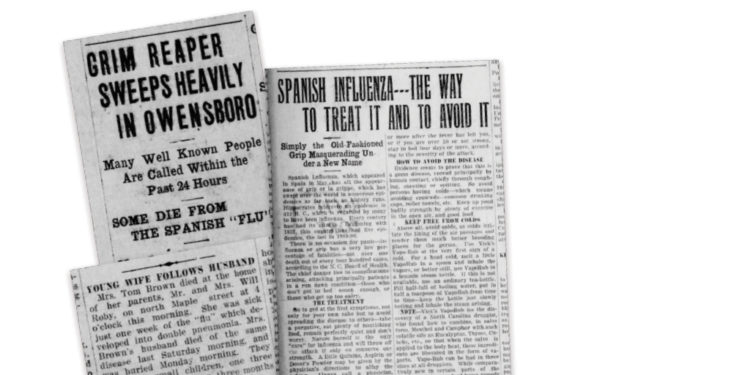We have all – at one time or another – yearned for a return to “the good old days,” when things were slower and simpler.
In our imaginations, we picture a time when people stayed home and spent their time playing checkers or sitting on the front porch swing with a glass of lemonade as the fireflies blinked in the dusk. We think of life in Mayberry or up on Walton’s Mountain, and we tell ourselves we would trade our fast-paced, high-tech existence for those experiences in a heartbeat.
Better be careful what you wish for, or you just might get it.
And so we have.
Anybody old enough to have lived through it was too young to remember the Spanish Flu epidemic of 1918, but that’s the closest comparison we have to our current experience of being sheltered in place and #HealthyAtHome, as Gov. Uncle Andy reminds us daily.
So it’s hard to really make an apples-to-apples evaluation of their experience versus ours, but we can make a few educated guesses and extrapolate a few thoughts with what we do know.
First of all, information is much more readily available to us now than it was to them then.
Newspapers and maybe radio were about it back in the day … and anyone who think today’s media sensationalizes stories ought to take a look at what was going on in our grandparents’ day. It’s a real eye-opener, to say the least, with scary headlines in big bold type, followed by every adjective in the thesaurus to communicate “doom and gloom.”
But people were people then, just as they are now. A notice in the Oct. 14, 1918, Messenger-Inquirer threatens storeowners thusly: “Merchants of Owensboro will please take notice that advertising special sales to attract crowds during the Spanish ‘flu’ epidemic will be a violation of the state board of health.”
In other words, “You can’t be doin’ that.”
Just a few days earlier, on Oct. 9, the newspaper reported that the Owensboro High School football team had assumed they would not be allowed to practice “and they began to cuss the Kaiser,” but then Coach Acker informed the team they could, indeed, continue to practice despite the epidemic swirling through the city – even though schools themselves were closed. Their reasoning? “They are in the air all of the time and there is no reason why it should be stopped.”
By Oct. 21, at least some people were under the impression that inhaling the steam of Vick’s Vapo-Rub would prevent infection … as well as avoiding crowds of people or anyone coughing, sneezing or spitting.
But a later article – Dec. 27 – included a report from Allentown, Pa., saying that city’s mayor had proposed that all dogs and cats should be killed (!!!) as they were the carriers of the disease. He did offer a way out, though: Pets could be spared if the owner shaved off all of its fur.
All this because, as an Oct. 29 article informed its readers, “a mysterious little microbe commenced floating through the crisp October air, and got the people in a panic about assembling in crowds.”
That was just one day after a front-page article ran under the headline “Grim Reaper sweeps heavily in Owensboro” – which might explain why people would be in a “panic.” According to this article, “many well-known people (were) called within the past 24 hours.”
They didn’t have Facebook posts and memes back then to cheer one another up, but someone named Luke McLuke demonstrated his creativity with the following poem:
“You mustn’t cough, you mustn’t sneeze,
You must keep out of draft or breeze;
You mustn’t laugh, you mustn’t cry,
And you must guard both mouth and eye.
You mustn’t breathe, you mustn’t drink,
And you must always stop and think
What next to do, or not to do,
So you’ll avoid the dreaded ‘flu.’
Be keerful, men, both day and night,
Or else the doggone germ will bite
You on your unprotected head,
And then they’ll cart you off to bed.
As soon as you begin to sniff,
For old friend Doctor you should shout:
The Spanish flu’ll get you if
You don’t watch out!”
Ah, the good old days – then and now.










